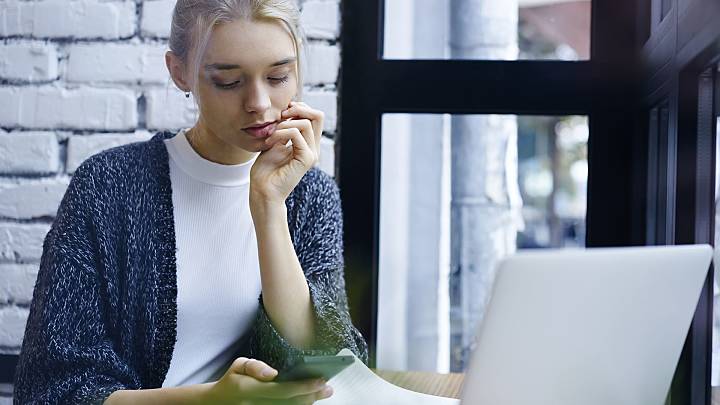Interstitial Cystitis

Medically reviewed by
Dr Kathryn BasfordLast reviewed: 04 Jul 2019
What is interstitial cystitis and what are the symptoms and treatments?

Interstitial cystitis (also known as ‘bladder pain syndrome’ or 'chronic cystitis') is the name used to describe a chronic or long-term inflammation of the bladder. There’s usually no infection behind interstitial cystitis, but you may experience pain and a frequent urge to pee.
Interstitial cystitis is more common in women aged over 31 and currently has no cure. The symptoms can be managed with lifestyle changes and some treatments.
Is it the same as cystitis?
Cystitis is a type of urinary tract infection that causes the bladder to become irritated and inflamed. For some people it might get better after a few days, while others might need antibiotic treatment, like MacroBid (nitrofurantoin).
Unlike cystitis, interstitial cystitis is more of a long-term inflammation of the bladder, which causes pain and problems with peeing. It’s not caused by infection so antibiotics don’t help.
Symptoms
The symptoms of interstitial cystitis can be mild or severe and vary from person to person. You may notice the symptoms more after common triggers like a full bladder, having your period, stress, and exercise. Some symptoms of interstitial cystitis include:
- pain below your lower abdomen (stomach) when your bladder is full, which feels better after you pee
- sudden urge to pee
- frequently peeing during the day and at night
- pain during sex
The symptoms of interstitial cystitis often happen in phases. You may get times when they last for weeks or months and get better, then other times when they are worse again.
Causes
The causes of interstitial cystitis still aren’t clear, but there are studies that have suggested some reasons why it may happen. These include:
- damage to the tissues that line the inside of your bladder which can cause toxins in the pee to leak into other areas, like surrounding muscles and nerves, leading to irritation and pain
- your immune system attacking your bladder by mistake
- an allergic reaction to the pee that’s in your bladder
- an issue with the muscles that surround your bladder that tense up to control when you pee
Diagnosis
There is no concrete test for diagnosing interstitial cystitis yet, but doctors are able to use some key information about your symptoms and health history to make a diagnosis. These points are:
- a general medical history, taking into account your symptoms, how bad the pain is, how often you need to pee, any past or current medical conditions, your diet, and any prescription drugs you’re taking
- a physical exam which will also include an examination of the nerves around your lower abdomen and genital areas
- urine tests to rule out any infections
- a cystoscopy, when a thin tube with a camera is passed through the tube you pee from (urethra) to check for other bladder diseases, tumours, or stones blocking the tube
Treatment
There’s currently no cure for interstitial cystitis but the symptoms can be managed with some lifestyle changes, therapies, and treatments.
Lifestyle changes
Some lifestyle adjustments that can improve your symptoms include:
- planning to take regular breaks to empty your bladder, to stop it becoming full and causing pain
- taking part in stress-reducing activities like exercise or meditation
- taking regular warm baths to soothe the pain
- stopping smoking, because the chemicals can irritate your bladder and cause pain
- reducing how much you drink before bed
- avoiding certain foods, like tomatoes, and drinks like alcohol, especially if you notice they trigger your symptoms
Medication
Medications used to treat symptoms of interstitial cystitis can include:
- over-the-counter painkillers, like paracetamol and ibuprofen
- over-the-counter antihistamines that reduce immune reactions, like loratadine and cetirizine
- stronger painkillers available on prescription, like amitriptyline, gabapentin and pregabalin
- tolterodine, solifenacin or mirabegron – these help relax the bladder muscles
- cimetidine – a prescription antihistamine medication
- pentosan polysulfate sodium (Elmiron) – this may help repair your bladder’s lining
Supportive therapies
The following therapies are known to be helpful with relieving symptoms:
- physiotherapy – massaging the muscles below your abdominal (stomach) area may help reduce any strain on your bladder
- bladder retraining – to help you learn to hold more pee in your bladder before needing to go to the toilet
- psychological therapy – to help you cope with your symptoms and their impact on your daily life
- transcutaneous electrical nerve stimulation (TENS) – where a small battery-operated device is used to relieve pain by sending electrical impulses into your body
- sacral nerve stimulation – your sacral nerves are the major link between the spinal cord and nerves in your bladder. Stimulating these nerves may reduce any strong urges to pee
Surgery
Some surgical procedures that may be carried out if you have clear abnormal areas (lesions) in your bladder, or other treatments don’t work, include:
- cauterisation – where ulcers (wounds) inside the bladder are sealed using an electrical current or laser
- bladder distension – the bladder is stretched with fluid, which can help diagnosis and may temporarily relieve your symptoms
- botulinum toxin injections – a chemical called botulinum toxin (like Botox) is injected directly into your bladder to temporarily relieve your symptoms
- neuromodulation – an implant that stimulates your nerves with electricity is placed inside your body to help relieve pain and reduce sudden urges to pee
- augmentation – making the bladder larger using part of the small intestine. This usually also includes removing any inflamed areas of the bladder
When to speak to a doctor
You should contact your GP if you notice a persistent pain in your lower abdomen (stomach) area or any ongoing changes in your normal routine of peeing.
Your GP will ask you some questions about your symptoms and examine you. You may then be referred to a specialist (most probably a urologist) for more specific tests and further treatments.

Dr Kathryn Basford is an IMC and GMC registered GP who works with our Irish team here at ZAVA. She graduated from the University of Manchester and completed her GP training at Whipps Cross Hospital in London.
Meet our doctorsLast reviewed: 04 Jul 2019
-
Mayo Clinic (2019). Interstitial cystitis. [online] Available at: https://www.mayoclinic.org/diseases-conditions/interstitial-cystitis/diagnosis-treatment/drc-20354362 [accessed 30th April 2019].
-
National Health Service (2019). Interstitial cystitis. [online] Available at: https://www.nhs.uk/conditions/interstitial-cystitis/ [accessed 30th April 2019].
-
Parsons, C. L. et al (2014). Role of urinary cations in the aetiology of bladder symptoms and interstitial cystitis. Functional Urology; 2(114): 286-93.
-
Urology Care Foundation (2019). What is interstitial cystitis/bladder pain syndrome? [online] Available at: https://www.urologyhealth.org/urologic-conditions/interstitial-cystitis [accessed 30th April 2019]
Cystitis bladder infections are caused by bacteria and need to be treated with antibiotics. ZAVA offers a variety of treatment through a convenient, discreet service.




IMC-Number: 429637

IMC-Number: 425122



